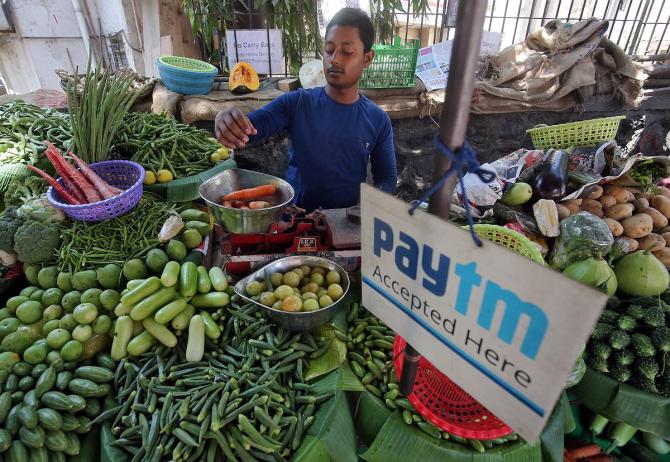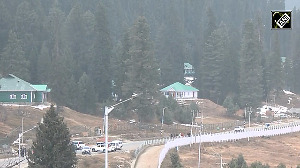It’s mid-morning and the two-kilometre stretch from Rashbehari Avenue to Gariahat Market is bustling with activity.

Dotted with saree shops and hawker stalls that sell everything, from hairpins, hangers and towels to hosiery, mobile phone covers and kurtas, this is one of South Kolkata’s busiest shopping areas.
And it is beginning to wake up to the Paytm crisis.
A major diagnostic centre along this stretch is preparing to shift away from the Paytm payment platform.
“We have already made arrangements with a bank; we will use the QR code,” the manager says.
“The changeover will be effective before February 29.”
February 29 onwards, users will not be able to add funds to their Paytm Payments Bank Wallet, though they will still be able to use the services and the existing balance in the wallets.
Larger retail outlets in the area seem to prefer QR codes from banks.
The proprietor of a store that sells mattresses says, “I have QR code from two banks. It’s the safest thing to do.”
Some hawkers have stopped dealing with Paytm altogether.
Rajat Das, a clothes stall worker, says, “Our owner has instructed us to stop Paytm transactions.
"Paytm is having problems with the Reserve Bank of India (RBI).”
Not everybody knows the details of the crisis, but many have stopped using it simply because others in the market have done so.
Several hawkers on the Gariahat stretch are uncertain about what lies ahead for Paytm.
Balmiki Kumar, who sells sundry items from hats to handkerchiefs, started using Paytm a few months ago for convenience.
“If someone buys an item worth Rs 20, I ask them to pay for it through Paytm.
"It’s difficult to give loose currency all the time,” he says.
He contemplates shifting to another platform, but there are those who are confident that Paytm will come out of this unscathed.
“Nothing will happen, I am telling you,” says Gourab Saha, who owns a stall that sells multi-coloured digestive lozenges.
As “proof”, he shows a message from Paytm, which says that the QR code will be in operation even after February 29.
Over in Maharashtra, the state chapter of the Confederation of All India Traders (CAIT) has issued an advisory for Paytm users, urging them to switch to alternative payment options.
CAIT National President BC Bhartia and Secretary General Praveen Khandelwal said the recent restrictions imposed by the RBI on Paytm have raised concerns about the security and continuity of financial services provided by the platform.
The advisory, says CAIT Mumbai’s Chairman Ramanik Chedda, is a precautionary measure to protect the financial interests of traders.
“We encourage users to stay informed and take proactive steps to ensure the security of their funds."
The mood isn’t very different in New Delhi’s bustling Chandni Chowk market.
There is uncertainty and confusion. Some traders are acting on it, others are in a wait-and-watch mode.
Bipin Kumar Yadav, who set up a roadside kiosk near Red Fort some six months ago, has switched to BharatPe recently from Paytm.
“I have been using Paytm from the time I started my business, but I don’t think I will use it anymore,” he says.
“A personnel from BharatPe approached me three days ago and I switched to their service.”
Khadi India’s office in this Old Delhi market uses Bijli Pay for digital transactions.
“We had also thought about keeping QR scanners of other companies in our store, but after the RBI restrictions on Paytm, we have dropped that idea.
"We won’t take that risk,” says the manager who does not wish to be named.
While he says he wouldn’t recommend Paytm to anyone, there are those who still swear by the platform.
The Old Famous Jalebi Wala, a shop that has been in business since 1884, is determined to carry on using it for transactions.
"We have been using its service for the last three years and find it satisfactory,” says Abhishek Jain, the fourth-generation member of the family that started the establishment.
“We have never faced any problem with it. I am not worried because the Paytm app service works fine.”
He is of the view that this is a tactic by “some big player” to buy Paytm.
“I just bought the shares of Paytm, so there!” he says.
Several traders say it was Paytm’s seamless service that made them adopt and stick to it.
Gautam Narang, owner of Mirchi Ram restaurant, has been using the platform for four years and doesn’t plan to switch to other services.
“I have tried other services, but they don’t compare with this one,” he says.
Some, however, express ambivalence, like Arun Kumar, owner of Balaji Saree Centre, who has been using the platform since 2016.
“We mostly use Paytm with other services.
"It will be hard to make a switch since most customers use Paytm for transactions,” he says, adding, “The situation Paytm is in right now is a problem for us.”
Like Kumar, Rajesh, who runs Punjab Stainless Steel House, a crockery store, says things might get tough for him if Paytm services are altogether banned.
“Traders might face a problem if the matter isn’t resolved,” he says.
Diwan Chand Chhabra, owner of Kali by Chhabra, a clothing store, adds that they will continue using Paytm till the time customers use it.
“As a trader, my concern is the money, not the medium it comes through,” he says. “So, we will use whatever the customer uses as a transaction method.”
Sharleen D’Souza contributed to this report











